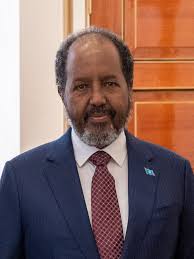 Introduction
Introduction
In the heart of the Horn of Africa lies Somalia—a nation rich in culture, history, and resilience. Amidst its turbulent past, one figure has emerged as both a symbol of hope and a subject of scrutiny: Hassan Sheikh Mohamud. Serving as Somalia’s president twice, his journey from academia to the highest office reflects a blend of ambition, controversy, and a deep-seated commitment to his country’s future. This article delves into the life, career, challenges, and aspirations of Hassan Sheikh Mohamud, offering a comprehensive look at a leader who has significantly influenced Somalia’s modern political landscape.
Early Life and Academic Pursuits
Born on November 29, 1955, in Jalalaqsi, a town in the Hiran region of central Somalia, Hassan Sheikh Mohamud hailed from a middle-class family. His educational journey began in his hometown, where he completed his primary and secondary education. At the age of 26, he moved to Mogadishu, the capital, to further his studies. In 1981, he graduated with a Bachelor of Arts degree in technology from Somali National University. Seeking to expand his academic horizons, Mohamud pursued postgraduate studies in India, earning a master’s degree in technical education from Barkatullah University in Bhopal.
Academic and Entrepreneurial Ventures
Upon returning to Somalia, Mohamud embarked on a career in education. He began as an instructor at Lafole Technical Secondary School and later became the head of the Technical Teachers’ Training College affiliated with Somali National University. His passion for education led him to co-found the Somali Institute of Management and Administration (SIMAD) in 1999, which later evolved into SIMAD University. Serving as the dean until 2010, Mohamud played a pivotal role in shaping the institution’s direction and impact on Somali higher education.
Entry into Politics
The collapse of the Somali central government in the early 1990s plunged the country into civil war, leading to widespread instability. Despite the challenges, Mohamud remained in Somalia, working with various NGOs and UN agencies on education and peacebuilding initiatives. His commitment to national development and governance led him to establish the Peace and Development Party (PDP) in 2011. The following year, he was elected as a Member of Parliament in the newly formed Federal Parliament of Somalia.
In September 2012, Hassan Sheikh Mohamud made a significant leap into national politics by winning the presidential election, defeating the incumbent Sharif Sheikh Ahmed. His victory was seen as a step towards stabilizing the nation and moving away from clan-based politics. During his first term, he focused on national reconciliation, anti-corruption measures, and socio-economic reforms.
Challenges and Criticisms
Despite his initial popularity, Mohamud’s first term was marred by several challenges. His administration faced criticism for alleged corruption, media restrictions, and abuse of power. In 2017, he lost the presidential election to Mohamed Abdullahi Mohamed, commonly known as Farmajo. However, Mohamud’s political journey was far from over.
Return to Power
In May 2022, Hassan Sheikh Mohamud made a historic comeback by winning the presidential election for a second term, becoming the first person in Somalia’s history to be elected president twice. His return was seen as a mandate for continued reform and stability. Upon assuming office, he focused on strengthening institutions, enhancing security, and promoting economic development.
Recent Developments
In March 2025, President Mohamud survived an assassination attempt when a roadside bomb targeted his convoy near the presidential palace in Mogadishu. The attack, attributed to the militant group Al-Shabaab, resulted in several casualties, including the death of a journalist. Despite the harrowing experience, Mohamud remained steadfast in his commitment to lead Somalia towards peace and prosperity.
Conclusion
Hassan Sheikh Mohamud’s journey from an academic to a two-time president of Somalia is a testament to his resilience and dedication to his nation’s future. While his tenure has been marked by both achievements and controversies, his influence on Somalia’s political landscape is undeniable. As the country continues to navigate its path towards stability, the legacy of leaders like Mohamud will undoubtedly shape its trajectory.
Frequently Asked Questions (FAQs)
1. What is Hassan Sheikh Mohamud’s educational background?
Hassan Sheikh Mohamud holds a Bachelor of Arts degree in technology from Somali National University and a master’s degree in technical education from Barkatullah University in India.
2. How did Hassan Sheikh Mohamud enter politics?
After working with various NGOs and UN agencies on education and peacebuilding initiatives, Mohamud founded the Peace and Development Party in 2011 and was elected as a Member of Parliament in 2012.
3. What were the main challenges during his first presidential term?
His administration faced criticism for alleged corruption, media restrictions, and abuse of power.
4. When did Hassan Sheikh Mohamud return to the presidency?
He was re-elected as president in May 2022, becoming the first person in Somalia’s history to be elected president twice.
5. Was there any attempt on his life?
Yes, in March 2025, President Mohamud survived an assassination attempt when a roadside bomb targeted his convoy in Mogadishu.
6. What is his approach to governance?
President Mohamud focuses on national reconciliation, institutional reform, and socio-economic development.
7. How has his leadership impacted Somalia’s international relations?
His leadership has strengthened Somalia’s diplomatic ties and attracted international support for development initiatives.
8. What is his stance on security?
President Mohamud emphasizes enhancing security through institutional reforms and collaboration with international partners.
9. Has he faced any legal challenges?
While his first term faced allegations of corruption, there have been no confirmed legal proceedings against him.
10. What is his vision for Somalia’s future?
His vision includes a stable, democratic, and prosperous Somalia with strong institutions and a thriving economy.